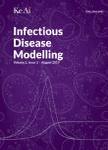A new epidemic modeling approach:Multi-regions discrete-time model with travel-blocking vicinity optimal control strategy
作者机构:Laboratory of AnalysisModeling and Simulation(LAMS)Department of Mathematics and Computer ScienceHassan Ⅱ University of CasablancaBP 7955Sidi OthmanCasablancaMorocco
出 版 物:《Infectious Disease Modelling》 (传染病建模(英文))
年 卷 期:2017年第2卷第3期
页 面:304-322页
学科分类:07[理学] 0701[理学-数学] 070101[理学-基础数学]
基 金:This work is supported by the Systems Theory Network(Reseau Theorie des Systemes) and Hassan II Academy of Sciences and Technologies-Morocco
主 题:Multi-regions model SIR epidemic model Discrete-time model Optimal control Vicinity Travel-blocking
摘 要:First,we devise in this paper,a multi-regions discrete-time model which describes the spatial-temporal spread of an epidemic which starts from one region and enters to regions which are connected with their neighbors by any kind of anthropological *** suppose homogeneous Susceptible-Infected-Removed(SIR)populations,and we consider in our simulations,a grid of colored cells,which represents the whole domain affected by the epidemic while each cell can represent a sub-domain or ***,in order to minimize the number of infected individuals in one region,we propose an optimal control approach based on a travel-blocking vicinity strategy which aims to control only one cell by restricting movements of infected people coming from all neighboring ***,we show the influence of the optimal control approach on the controlled *** should also note that the cellular modeling approach we propose here,can also describes infection dynamics of regions which are not necessarily attached one to an other,even if no empty space can be viewed between *** theoretical method we follow for the characterization of the travel-locking optimal controls,is based on a discrete version of Pontryagin s maximum principle while the numerical approach applied to the multi-points boundary value problems we obtain here,is based on discrete progressive-regressive iterative *** illustrate our modeling and control approaches by giving an example of 100 regions.



